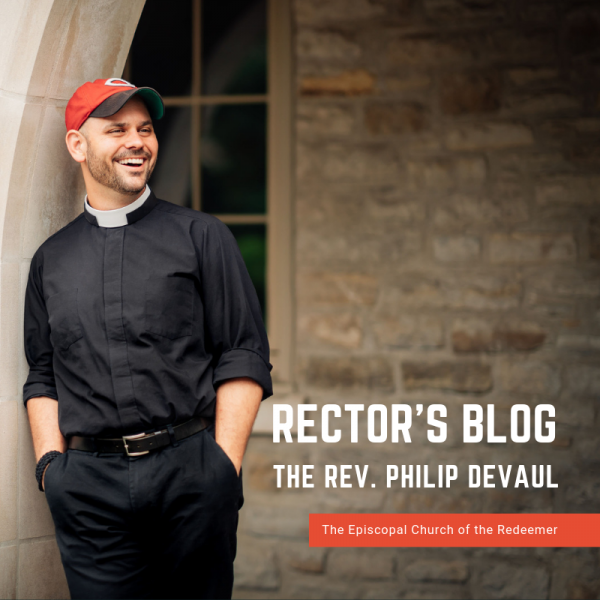Rector's Blog: God's Perfect Vision

There’s a difference between the way we see ourselves and the way God sees us. For instance, we often see ourselves as valuable only when we are successful, productive, achieving, or well-liked. Meanwhile, God sees each of us as creations of immeasurable value. God loves us wildly and extravagantly even when we see ourselves as unlovable and unworthy. God sees us differently than we see ourselves.
God’s perfect vision can cut both ways though, and we want to wake up to that. As we’ve been meditating on the Book of Revelation in sermons and Bible Studies throughout Easter, we have been particularly attentive to the recurring theme that God sees us for what we really are. And this vision cuts both ways because, just as we’re capable of thinking we’re unlovable even while God is loving us, we’re also capable of living in denial about the damage we are capable of doing – and the damage we have already done.
In Revelation, God looks upon a world that does not understand its own value – its own belovedness – and this is profoundly damaging. Because when you don’t see things as valuable, you don’t treat them well. When you don’t see people as valuable, you don’t treat them well. When you don’t see yourself as valuable, you don’t treat yourself well. This is the crux of the sadness in Revelation: A beloved people that live in denial of the pain they cause not out of hubris or abundance of pride – but because they don’t recognize the presence and holiness of God in every person and thing around them. They don’t see the presence and holiness of God worth caring for even in themselves.
As our church has begun to dig into the work of Becoming Beloved Community - the work of racial reconciliation in our church, in our lives, and in our world – we have had to begin the work of waking up to who we really are: This is work of self-examination, repentance. And how exactly does a church like Redeemer – a community that is made up predominantly, overwhelmingly, of white people – begin the work of racial reconciliation? What does that even look like?
In Revelation, it looks painful. It looks like people not wanting to be honest about their situation, not wanting to ask the tough questions about how the world got so broken. But that’s not the whole story of Revelation: throughout the narrative, there is something more stubborn and persistent than our denial: The redeeming power of God’s love. God will not let us go, will not abandon us, and will not let us sit in a sick stasis of indifference. God insists we wake up. God insists we join the battle for the soul of this world. And God stands in utter solidarity with us when we do that work.
The evil of white supremacy is real. It has infected our society for generations and has turned us into people who seem indifferent to the homogenous whiteness of our church community and our neighborhood. We don’t want to talk about this because we are worried what it means about us if it’s true. We are worried that if we’ve contributed to or benefited from white supremacy, we will in fact be unlovable, worthless, incapable of receiving God.
This is why the stubborn persistence of God’s love is so essential. This is why the Gospel matters so tremendously to us. Because we have participated in white supremacy, and we have benefited from it. And as we wake up to this revelation, we are going to need to lean completely and utterly into the presence and holiness of God. We are going to need to trust that God does not see us as only valuable if we have been perfect, as only worth loving if we have always loved perfectly. Just as God will not let us live into denial, God will not abandon us. When we take on the work of dismantling white supremacy, of doing our part in the work of racial reconciliation, we begin to see the world the way God sees it: As profoundly valuable, deeply holy, and fully beloved.
And when we stand up do to do this work, God will stand with us – not against us. When we join the battle for the soul of this world as it’s played out in the racial and cultural dynamics of our community – we will be partnering with no less than God Almighty.